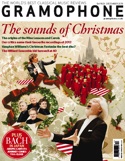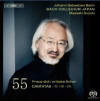Texte paru dans: / Appeared in:
*

GRAMOPHONE (12 /2013)
Pour s'abonner /
Subscription information
BIS
BIS2031

7318599920313 (ID355)

Reviewer: Jonathan
Freeman‑Attwood
End of the road
for Suzuki’s 18-year Bach cantata journey
While John Eliot Gardiner performed his nearcomplete Bach sacred cantata
‘pilgrimage’ in the course of the great millennial year in 50 contrasting
locations, Masaaki Suzuki’s 18-year journey has been a gradually unfolding
musical voyage (a chronological rather than seasonal progression) and in the
singular, luminous hallmark acoustic of the Shoin Women’s University Chapel
in Kobe. Comparisons of two exceptional Bach projects are largely rendered
odious by the fact that Gardiner’s work largely represents a repository of
recorded concerts while Suzuki’s has been a considered, slow-burn studio
project. This last release conveys an appropriately celebratory testament to
a truly extraordinary cultural legacy. If the early critical rhetoric of Vol
1 (Cantatas Nos 4, 150 and 196 – 6/96) was one of astonishment that a
Japanese choir could sing such perfect German or that Japanese
instrumentalists could comprehend ‘style’ so effortlessly, it soon became
apparent that the world is smaller than we think and that Suzuki’s subtle
and embedded understanding of Bach was yielding an important set of new
recorded ‘texts’ in a global musical language.
This final volume highlights the maturing sense, as witnessed especially in the latter half of the series, of Bach Collegium Japan’s growing stature and confidence to break free of generic convention towards ever greater interpretative character. A genial corporate essence has always defined BCJ’s music-making, evident in the unforced, bursting joy of the opening chorus of Lobe den Herrn (No 69).
Its fastidiously prepared arias also mark the remarkable contributions of two important soloists throughout the years, Robin Blaze and Peter Kooij. If Kooij has sounded tired on occasion, the final flourish encourages some exceptional singing in the wonderfully fullbreathed and all-purpose Freue dich (No 30 – a cantata almost unaltered from a recently composed secular cantata for a local aristocrat in 1737), and even more in the jazz-swung alto gavotte, ‘Kommt, ihr angefochten’, one of Bach’s most galant vocal creations from his later years and suitably shaded by Blaze.
The Gloria (No 191) appropriately
signs off this magnificent 55-disc achievement, music which found its resting
place in Bach’s vocal denouement, the Mass in B minor (and how he improved it).
No complete series can deliver equal inspiration in every volume but Suzuki and
BCJ have created an indelible mark on Bach’s recorded vocal landscape. The best
is as good as anyone anywhere – and the whole, of the six complete cantata sets,
probably the most consistent.
Cliquez l'un ou l'autre
bouton pour découvrir bien d'autres critiques de CD
Click either button for many other reviews


